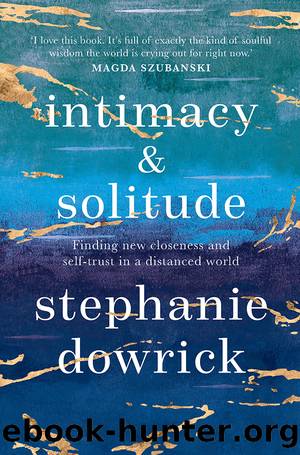Intimacy and Solitude by Stephanie Dowrick

Author:Stephanie Dowrick
Language: eng
Format: epub
ISBN: 9781761061820
Publisher: Allen & Unwin
Published: 2020-12-09T00:00:00+00:00
At ease with yourself
That image of the crying child at the bottom of the garden disturbs me deeply. It works on my own worst fears of abandonment and despair, fears which are real in all of us, even when we were well-protected infants; fears that are only partially and impermanently contained as we reach adulthood.
This may add to your understanding of why solitude/solitariness/aloneness/loneliness are so frequently lumped together and given extremely bad press, with many people believing that being in the company of almost anyone is preferable to being in no company at all. Yet that bad press takes no account of the potential richness of solitude and also ignores the reality of many peopleâs lives.
More than a quarter of the population in Western countries lives alone and the numbers are increasing. They would seem to be the people most likely to be hard up against the questions which aloneness can raise, but it is worth repeating: it is neither the presence nor the absence of others which of itself dictates whether you are experiencing solitude or enduring loneliness.
Rafe explains this. âIn my family of first-generation migrants I never stopped hearing âItalian thisâ and âItalian thatâ as though I had to live my life not only by my own large familyâs rules but on behalf of every Italian ever born. It was an expression of their grief and ambivalence that they had ever left Italy that they had to recreate their ideal of Italy in our own home. I always felt different to the rest of them and uncomfortable about this and guilty even, with no possible way of expressing it. I almost always felt shut out from the others of them and was often truly lonely.â
When you feel relatively âat oneâ with yourself you are most likely to be able to welcome solitude: feeling, to quote Winnicott, calm, restful, relaxed and one with people and things when no excitement is aroundâwhether or not you are actually alone. During times when you are experiencing yourself as fragmented or incomplete, or âinvisibleâ to those around you, and when that feeling is accompanied by self-doubt, then you are more likely to experience being alone not as solitude but as lonelinessâwhen what you donât have dominates your thinking and feeling.
Feeling not-whole usually expresses itself in a wish to bring something into your life from the outside which will, in your fantasy, fill you up and make you feel whole on the inside. We are all vulnerable to this. Our fantasies may vary but the desireâto increase our sense of wholenessâstems from the same ânot wholeâ source within. Maybe in your case your longing is for a partner, a more loving partner, a job, a better job, a baby, another baby, a house, a change of town, a change of appearance or a greater sense of direction.
A loving partner, a decent job, children if you want them, reasonable housing, values you can wholeheartedly espouse: these are legitimate needs, but it is possible to have all those needs met and still to feel empty, incomplete, unsatisfied, not-whole.
Download
This site does not store any files on its server. We only index and link to content provided by other sites. Please contact the content providers to delete copyright contents if any and email us, we'll remove relevant links or contents immediately.
Four Thousand Weeks by Oliver Burkeman(1852)
What Happened to You? by Oprah Winfrey(1767)
Karma by Sadhguru(1612)
This Changes Everything by Unknown(1508)
You Are a Badass: How to Stop Doubting Your Greatness and Start Living an Awesome Life by Jen Sincero(1186)
Don't Sweat the Small Stuff...and It's All Small Stuff by Richard Carlson(1121)
Infinite Circle by Bernie Glassman(1050)
How to Do the Work by Dr. Nicole LePera(1009)
Let's Talk About Hard Things by Anna Sale(994)
Declutter Your Mind: A step by step guide to learn to control your thoughts, stop worrying, relieve anxiety and eliminate panic attacks and negative thinking by Mia Chandler(968)
Who Moved My Cheese? by Spencer Johnson(959)
The 4-Hour Workweek by Timothy Ferris(958)
Real Strength: Build Your Resilience and Bounce Back From Anything by Psychologies Magazine(944)
The Path of Greatness--The Game of Life and How to Play It and Other Essential Works by Florence Scovel Shinn(928)
Breakup Bootcamp by Amy Chan(896)
Be Your Best Self by Mike Bayer(892)
Curative Magic by Rachel Patterson(883)
The Book of Hope by Jane Goodall(872)
Advice for Working Moms (HBR Working Parents Series) by unknow(867)
